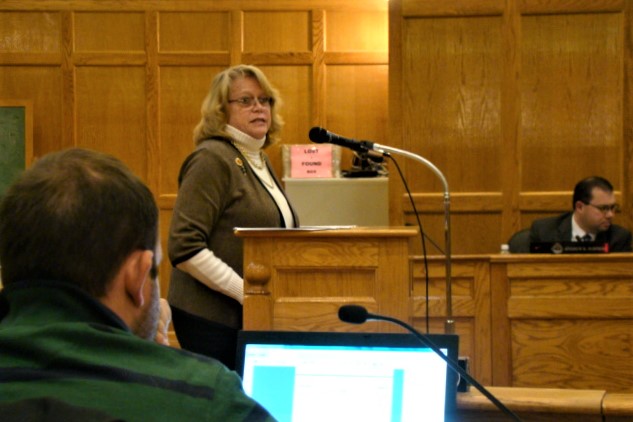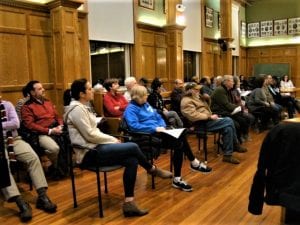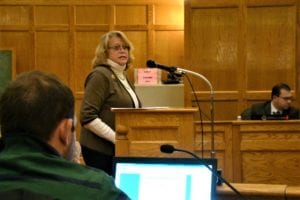WESTFIELD – Several dozen residents attended the public hearing on the tax shift Nov. 19 to determine the percentages of the tax levy for fiscal year 2020 on residential and business properties.
The public hearing was followed by the City Council vote, which considered shifting the rate, but in the end voted to keep it at 1.66.
Prior to the hearing, At-large Councilor John J. Beltrandi, III was voted as president pro tem for the council, until Ralph J. Figy’s term as acting mayor ends following the inauguration on Jan. 6 of mayor-elect Donald F. Humason, Jr.
Assessor Robin Johnson started the hearing by saying that the values of properties in town have increased by five percent, or $158,000 across the board. She said values went up based on sales in 2018, which increased by ten percent overall. She said the Department of Revenue requires values to be within five percent, higher or lower, of sales of single family homes.
“We look at all the sales that happened. Sales all went up, so taxes had to go up,” Johnson said.
Several residents, including Rich Roy, asked when and how the assessments were done. Johnson said houses had already been assessed, but the increase was based on the increase of overall sales.
“Property values should be what the property is worth,” Roy said, with Johnson countering that they are based on what the property sells for. Johnson also said that any resident who feels their assessment is incorrect may pursue an appeals process.
“You all must have known this would happen, so why didn’t you cut taxes,” asked Tam Brudzinski of Russellville Road.
“We can’t seem to get there,” answered At-large Councilor Dan Allie, adding that the council has to manage an entire city, and provide services to young people and seniors.
“If I may, as a body, the board voted to approve the budget,” Beltrandi said.
At-large Councilor Matthew Emmershy said the council did know when Mayor Brian P. Sullivan presented a budget with a 2.5% increase.
“Ultimately, where we’re at tonight is do we leave the shift where it sits, or do we move the needle one way or the other,” Emmershy said, adding that the shift pits residents against businesses.
At-large Councilor Dave Flaherty said the budget increase was reduced by $445,000, to $1.9 million. He said taxes will go up by 2.5%.
“For residents, I want you to be aware that businesses are paying the majority of the taxes,” said At-large Councilor Andrew K. Surprise.
Ward 1 Councilor Mary Ann Babinski said based on the decisions she’s made at budget time the last four years, she has proposed that residents form a taxpayer’s alliance. “People need to get together sooner than June and look at services you might lose. What would you be willing to give up?”
Several other councilors encouraged residents to lobby the state for more money in local aid.
Talking about Chapter 90 funding, Allie said, “Out of a $43 billion budget, the state only provides $200 million to cities and towns for road maintenance.” He later said that figure should be $500 million a year.
Surprise also mentioned tax exempt properties in the city, including the university and hospital, which together are valued at $40 million. “We have to make cuts to employees and services. You have to make the council accountable. Elections matter,” Surprise said.
Kate Phelon, executive director of the Greater Westfield Chamber of Commerce asked for a tax shift of 1.61, which would lessen the burden on businesses. “It’s important for everyone to understand that residents make up the greatest percentage of accounts for property tax, but businesses pay the greatest amount,” Phelon said, adding that businesses also put the least burden on services. “If you want business, economic development, let’s make it easy,” she said.
Tom Woodson, who serves on the Westfield Redevelopment Authority also noted that big commercial properties are paying the same rate as the small properties. “When you say the big guys can pay it, keep in mind the small guys pay it, too.”
Matthew Roman said the excise taxes were created in the ‘40’s to pay for roads and bridges. “If we had the money we used to get, we would have no problem maintaining the roads. The only way to knock down the tax rate, is for the mayor and department heads to all work together,” Roman said.
Richard Salois said the meeting was to determine the tax shift and the proposal from Phelon was to shift it from 1.66 to 1.61. He said people on fixed incomes or low income cannot afford the increases, and may have to face questions of whether to pay their taxes or eat. “Companies have ways of increasing their income that many residents don’t,” he said.
Newly elected At-large Councilor Kristen Mello asked whether any patterns emerged regarding property values and the water contamination issue, which Johnson said did not show up.
At the start of the Special City Council meeting to vote on the tax shift, At-large Councilor Cindy C. Harris proposed a shift factor of 1.69, which would favor residents. Flaherty made a motion to amend to 1.61, favoring businesses, which did not receive a second.
Surprise made a motion to amend to 1.64, which was seconded.
“Everybody wants to lower taxes. The time to do that is in June, not now,” Flaherty said, adding that each tick of a percentage points is a difference of $12.50 per year. “Businesses are paying most of the taxes,” he said, adding, “I’d like to see it stay about even.”
Babinski asked whether as in stormwater fees, there could be a separate rate for small businesses. “A happy medium between residential and commercial.”
Flaherty said there is a $10,000 exemption right now on computers and office furniture that business don’t have to pay taxes on.
The motion to amend the tax shift to 1.64 failed. A motion to amend to 1.66 was then made and approved, keeping the tax shift the same for fiscal year 2020.










